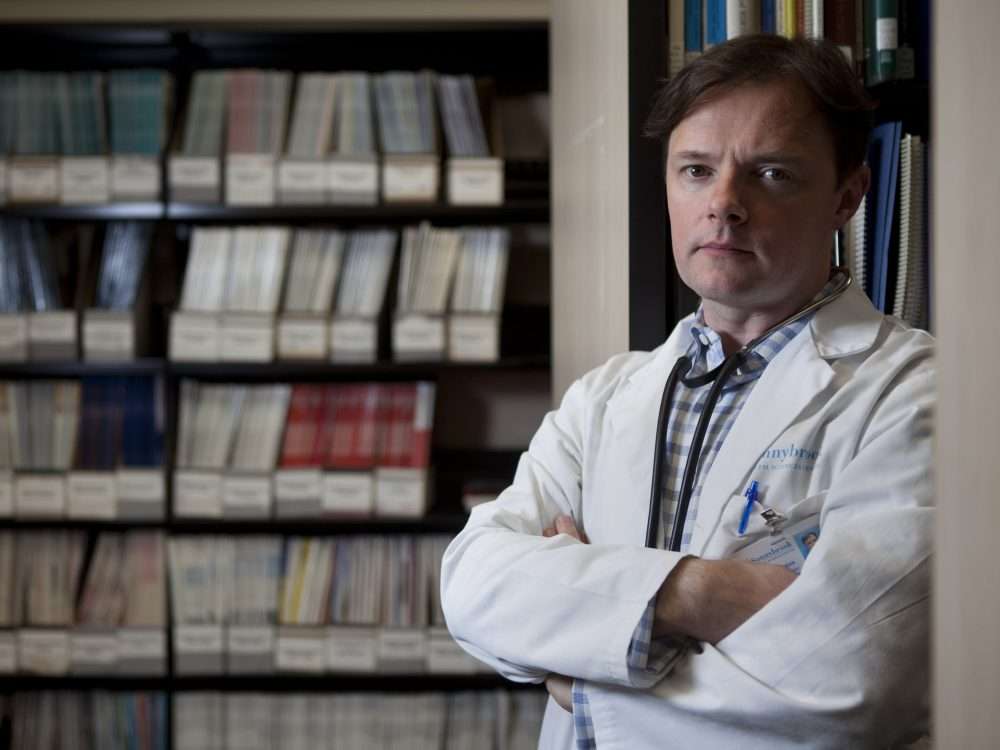Timothy Caulfield felt as if blood was pooling in his brain. He was hanging upside down by his ankles, his gravity boots strapped to a bar, and his crew was worried he might kill himself.
In theory, inversion therapy claims to detoxify and drain the lymphatic system, and decongest the organs. But, while many detox regimens sound “science-y,” detoxing is clearly bunk, Caulfield said.
The Canadian bioethicist explores the enduring popularity of detoxes and cleanses in the first episode of his Netflix documentary series, A User’s Guide to Cheating Death.
In addition to inversion therapy, the professor of health law and policy at the University of Alberta tested a variety of diets and products that claim to purge pollutants and poisons from our bodies, including ionic foot baths, magnetic therapy, sweating in an infrared sauna, beer detox, “teatoxing” and detox trampolining (the theory being we can literally bounce stored poisons and debris out of our systems).

Commercial detoxes and cleanses are wildly popular after holiday overindulgence. Out with the old, in with the new. “Detox your way to a brand new you,” the pitch goes. The idea that flushing and purifying our innards can somehow push the re-set button has enormous intuitive appeal, Caulfield acknowledged.
But “there really isn’t any science to support it,” he said.
Indeed, a 2015 critical review of the evidence concluded that, despite glowing anecdotal reports, scant clinical evidence exists to support the use of commercial detox diets.
Purveyors never really make clear exactly what toxins or chemicals they’re removing, the authors wrote in The Journal of Human Nutrition and Dietetics, “or the mechanism by which they eliminate them, making it difficult to investigate their claims.”
In mainstream medicine, “toxins” generally refer to drugs and alcohol. To “detox” means to abstain from drink or drugs until the bloodstream is clear of them.
In the booming world of detox marketing, the term “toxin” represents a hazy and undefined threat, Caulfield said. It plays on our broader fears about modern society, but also has “this almost spiritual element to it — an exorcism to get demons out of our bodies.”
It’s an idea others have said dates back to the earliest civilizations.
“The idea that we’re somehow poisoning ourselves and we need to atone for our sins seems to be part of human nature, which may explain why it’s still a part of most of the world’s religions,” pharmacist Scott Gavura wrote for Science-Based Medicine.
However, being exposed to chemicals of various sorts is a function of being human, said internal medicine specialist David Juurlink, who has tweeted his views on detoxes. (“Here’s a toxicologist’s explanation for how they work: They don’t.”)

In the U.S. alone, roughly 2,000 new chemicals are introduced into foods and consumer products annually, according to the authors of the paper in the Journal of Human Nutrition and Dietetics, Hosen Kiat and Alice Klein of Macquarie University Hospital in Sydney, Australia.
The detox industry “founds itself on the notion that chemicals can be neatly divided into ‘good’ and ‘bad’ categories,” Kiat, a cardiologist, said when the study was released. “In reality, it is the ‘dose that makes the poison.’”
Take lead. “We can all detect some amount of lead in our blood,” said Juurlink, a clinical toxicologist at Toronto’s Sunnybrook Health Sciences Centre. “It’s the function of living on a planet where lead is around. And it does tend to accumulate in people exposed to it. But being exposed to something and being sickened by it are two very different things.”
Otherwise healthy kidneys and livers are highly efficient at ridding our bodies of things we don’t need, whether toxins or medications, Juurlink said. For example, the kidneys eliminate drugs and other chemicals that are water-soluble; the liver secretes chemicals we don’t need into our our bile and the intestine.
“But I think people perceive the liver as an organ that can somehow be squeezed or wrung out,” Juurlink said, “or that the kidneys can be flushed out, or that the colon can be used as a conduit to forcibly clear our bodies of things.”
“I don’t doubt that when people use cleanses or they go on these wacky diets or use enemas of various sorts that they feel different afterwards,” Juurlink said. “But it’s not because these things have magically eliminated toxins.”
Very often a detox will contain a laxative which, depending on the type, can lead to low potassium or magnesium levels, even dehydration, which can be lethal in the wrong person. Colonic “hydrotherapy” or irrigation, popular among naturopaths, can cause micro-tears in the colon.
“There will be people who will not be disabused of the notion that a detox is a good, healthy thing to do,” Juurlink said. “But for those who are wondering if it’s a good idea, the answer is an unequivocal ‘No.’”
Even the U.S. National Center for Complementary and Integrative Health — a body that has itself been criticized for promoting pseudoscience, according to Caulfield — has concluded there is no convincing evidence that fasting, juicing, colonics and other detoxes “actually remove toxins from your body or improve your health.”
The main health risks of many detox diets come from extreme fasting, which can cause protein and vitamin deficiencies and electrolyte imbalances. Detox dieters are also at risk of overdosing on supplements, laxatives, diuretics or even water.
People will lose weight on detoxes like the seven-day celery cleanse, because many border on starvation diets. Once stopped, the weight inevitably comes back.
Caulfield lost, and then quickly regained, three kilograms after he went on the Clean 21-Day Cleanse, detox program for “achieving vibrant health and restoring the body’s own natural ability to heal itself.”

The diet, which is backed by Gwyneth Paltrow’s lifestyle company Goop, consists of a shake for breakfast, lunch from a list of approved foods (no dairy, sugar, gluten, soy, corn, beef or pork), a shake for dinner and “Clean supplements” throughout the day.
The cleanse made Caulfield feel “crappy and grumpy,” mostly from the caffeine withdrawal, which “nearly killed” him. But he understands the appeal.
“You do get this high from the sense of accomplishment when you are finished,” he said.
“Even though I was totally aware of the scientific absurdity of what I was doing, I still felt a bit of that.”
National Post
• Email: skirkey@postmedia.com | Twitter: sharon_kirkey
